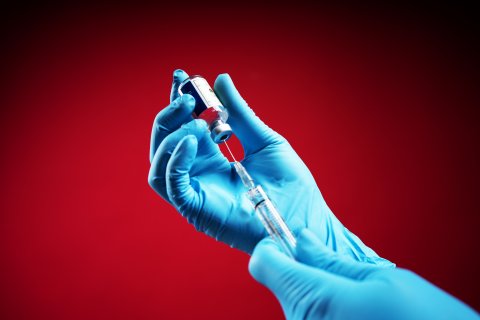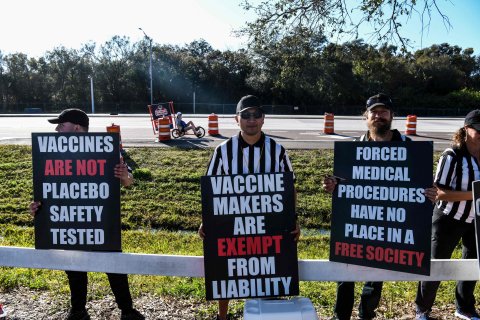On November 4, 2020, Brianne Dressen walked into a clinic in West Jordan, Utah to take part in a clinical trial for AstraZeneca's COVID-19 vaccine. A few minutes after getting the shot, her arm began to tingle and her eyes felt "weird," she says. Her symptoms soon got worse. She developed a fever and chills and her arm went numb. At one point she grew so sensitive to light and sound that she sought relief in a dark room wearing earmuffs.
By the time she got to the emergency room at the University of Utah Hospital in Salt Lake City, the numbness had spread from her feet upward to her legs. She had lost the ability to walk and could no longer control her bladder and bowels. "It was really scary," she says.
What followed was a long nightmare of seeking care for debilitating symptoms from doctors who, she says, were dismissive of her symptoms and dubious that a vaccine could be the cause. Although adverse effects from COVID-19 vaccines are rare, some of those who fall into that group say they have gotten short shrift by the medical establishment.

That may be due in part to the rarity of their conditions and the newness of the vaccines. The extreme politicization of the COVID-19 pandemic has also played a role. Many doctors, worried about spreading misinformation and contributing to vaccine hesitancy, have been reluctant to take complaints about severe vaccine side-effects seriously, according to some people who have suffered post-COVID-19 vaccine complications. Discussion among group members about severe vaccine side-effects has been flagged as misinformation by social media platforms, particularly Facebook, making it difficult for these individuals to gather and share information with one another.
"From top down, we are not allowed to be heard in any way, shape or form," wrote Dressen in an email. "Our lives are not misinformation," she added at a different point in time.
Solid data on how many people have developed neurological symptoms after taking COVID-19 vaccines is scarce. The Food and Drug Administration acknowledged a small increased risk of developing the rare condition Guillain-Barré Syndrome (GBS), a neurological disorder in which the body's immune system attacks nerves outside the brain and spinal cord, after taking the COVID-19 vaccine made by Janssen, a pharmaceutical company of Johnson & Johnson. Some people interviewed by Newsweek also reported severe neurological symptoms after taking the Moderna and Pfizer vaccines.
As of early March, there had been at least 40,000 reports of various neurological symptoms, such as tingling (pins and needles), tinnitus and paralysis following COVID-19 vaccines logged in the Vaccine Adverse Event Reporting System (VAERS), a nationwide database co-managed by the Centers for Disease Control and Prevention (CDC) and the FDA. VAERS can be used as an early warning system to spot rare adverse events, according to the U.S. Department of Health and Human Services, but it has limitations. For one, it is a passive reporting database, meaning it relies on physicians, patients, family members and so forth to make reports. And its entries are not all verified, which means the data cannot be used to reliably determine whether an adverse event is caused by a vaccine.
To find more precise data, scientists in the U.K. recently investigated vaccinations of more than 32 million people who had gotten a first dose. They found that that vaccination likely causes about 38 excess cases of GBS for every 10 million adults who receive the AstraZeneca vaccine, which is not licensed for use in the United States. For the Pfizer vaccine, the study found 60 extra cases of stroke per 10 million people.
The neurological risks posed by COVID itself are higher. The disease was found to be the likely cause of 145 cases of GBS, 123 cases of inflammatory disorders, including those of the brain and spine, and 163 cases of muscle weakness for every 10 million people infected. To put the numbers into perspective, more than 570 million COVID-19 vaccine doses have been administered in the U.S. so far. Because so many people have gotten shots, even rare cases can add up.
One study, of course, is not the final word on the subject. More information on rare adverse events is needed for "ongoing risk benefit evaluations of these vaccines," the authors of the U.K. study wrote. "Therefore, the identification of such rare adverse events is now a global scientific priority."

Knowing that their conditions are rare is small comfort to Dressen and other patients, who say they have had trouble getting their doctors to take them and their symptoms seriously. Dressen, an otherwise healthy 41-year-old, found doctors to be largely dismissive of the notion that vaccination may have been the cause of her symptoms. One rheumatologist that Dressen consulted and still sees regularly only refers to her illness as being "COVID-related."
After Dressen was admitted to the ER, her doctors considered GBS as a diagnosis but rejected it, she says. One specialist suspected her symptoms were the result of migraines. In the end, doctors diagnosed her with "anxiety due to the COVID vaccine," she says.
Dressen was so distraught with her deteriorating health that she eventually found her way to Dr. Danice Hertz, a 65-year-old retired gastroenterologist who also had complications after her first and only dose of Pfizer's vaccine–she says she experienced ringing in her ears, chest tightness, feelings of burning and numbness in her face, tongue, scalp and limbs, among other symptoms. Dr. Hertz started a support group that now numbers roughly 200 people.
Amid a dearth of medical attention, the group has served as a place of comfort and information exchange. Other private groups devoted to neurological complications have cropped up as well. Shaun Barcavage, a 52-year-old research nurse in New York (he asked that his workplace not be revealed) says he experienced tingling sensations, tinnitus, headaches and other ongoing symptoms after getting two Pfizer COVID-19 vaccines. Dissatisfied with his interactions with doctors, he started a Facebook group for others who also experienced post-vaccine tinnitus, which grew to about 3,300 members.
Facebook, in an effort to tamp down misinformation about COVID-19 vaccination, has shut down some of the groups, says Dressen. Although they have been able to reconstitute themselves as new groups, each time they lose members in the process. Barcavage says Facebook put his group under review for posting a link to a research paper but ultimately allowed it to stay active.
Some members have asked federal health authorities to publicly recognize the legitimacy of their symptoms and to raise awareness among community physicians. Dressen and another member of Dr. Hertz's group met with an official from the FDA and urged the agency to recognize small-fiber neuropathy—damage to the fibers of the peripheral nervous system, which can lead to sensations of numbness, pins and needles, and electric shocks—as a rare post-vaccine complication. She also wrote a letter to the CDC and the FDA, signed by 86 other group members. "We are collateral damage in the effort to stop the pandemic," the letter reads. "We are all honest, hard working Americans who genuinely believed we were doing our part by getting this vaccine. We are suffering... We are pleading with you to make the medical community aware of these reactions so we can get the medical care that we need and hopefully recover and return to our previously healthy lives."
Two FDA officials—Dr. Janet Woodcock, then FDA's acting commissioner and now principal deputy commissioner,and Dr. Peter Marks, director of the agency's Center for Biologics Evaluation and Research—followed up via email saying that they would look into the matter. (Neither Dr. Woodcock nor Dr. Marks were available for interviews.) Although the FDA would not comment on specific cases, a spokesperson told Newsweek in an email that its data did not show that neurological symptoms among COVID-19 vaccine recipients were more common than what would be expected in the general population, with two exceptions: the small increased risk of GBS from the Janssen vaccine and of fainting following each of the three vaccines authorized in the U.S. "To date, the systems in place to monitor vaccine safety have not identified safety signals for serious neurological outcomes following COVID-19 vaccination, including small fiber neuropathy," the spokesperson wrote.
Some doctors, however, have pointed out that the data about vaccine side-effects may not be complete. "Many of us have felt that it would be nice if there was much more systematic monitoring of these kinds of side effects than there is," says Dr. Patrick Whelan, clinical associate professor of pediatrics at UCLA. "The vast majority of people who get these vaccines are not being actively monitored."
A spokesperson at Janssen, the J&J company that makes its vaccine, said in an email that it shares any reports of adverse effects from individuals who receive a dose of their vaccine with the FDA and other health authorities. A Pfizer spokeswoman said in an email: "Based on ongoing safety reviews performed by Pfizer, BioNTech and health authorities, our COVID-19 vaccine retains a positive benefit-risk profile." Moderna and AstraZeneca did not respond to multiple requests for comment.
Efforts by Dressen and others to win recognition may have gotten swept up in the politics of vaccination. Dressen's case has provided fodder for Robert Kennedy Jr., a purveyor of numerous false claims about the dangers of COVID-19 vaccines, who tweeted about it.

And when Sheryl Ruettgers, another member of Dr. Hertz's Facebook group, developed "stroke like symptoms" after getting a Moderna shot, her husband, Ken, a former tackle for the Green Bay Packers, appealed to Wisconsin Senator Ron Johnson, a Republican who has spread misinformation about COVID-19 treatments and vaccines on many occasions. Johnson invited Dressen and others to appear at a press conference in June where she and others described sustaining life-altering complications after a COVID-19 vaccine. The event drew criticism from health experts.
Dressen, for one, was uneasy about the decision to appeal to Johnson. "We had been pushed into a corner with nowhere else to go," she wrote in a text message. "We had to take the chance."
Small Progress
In January 2021, Dressen's husband, Brian, contacted Dr. Avindra Nath, intramural clinical director of the National Institute of Neurological Disorders and Stroke at the National Institutes of Health (NIH), who offered to work with Brianne's doctors in Utah. According to Dressen, Dr. Nath spoke with the Utah doctors over the phone and recommended that they administer intravenous immunoglobulin (IVIG) therapy, in which antibodies derived from the blood of healthy donors supplement a patient's immune system. The treatment can mitigate some neurologic disorders including GBS. According to Dressen, the local doctors declined to work with the NIH doctors. One doctor told her she was "too fragile" to treat. (The doctor did not respond to Newsweek's request for an interview.)

The NIH doctors eventually offered to bring Dressen out to Bethesda, Maryland for research and treatment, which she accepted. According to her medical records from NIH, doctors diagnosed her in June 2021 with post-vaccine neuropathy (damage to the nerves located outside the brain and spinal cord), severe postural orthostatic tachycardia syndrome (a blood circulation condition characterized by a heart rate increase from lying to standing of at least 30 beats per minute in adults), sensory loss (in the hands) and short -term memory loss. They subsequently treated her with IVIG infusions. (Dr. Nath declined to comment on the specific case, citing patient confidentiality.)
Dressen is still taking an IVIG infusion every other week. She's doing better, she says. She no longer feels her heart beating out of her chest and sensations of tingling and electrical shocks have subsided somewhat.
She is trying to accept that she will be living with a chronic disease. Whereas she used to enjoy hiking up mountains, it's now a good day when she can walk around the block. On bad days, she needs a wheelchair. Her former life of teaching and snowboarding, she says, now seems like a dream.
About the writer
Joanna Broder is a science and feature journalist and editor.














